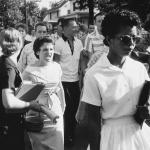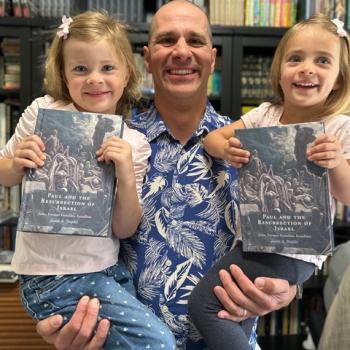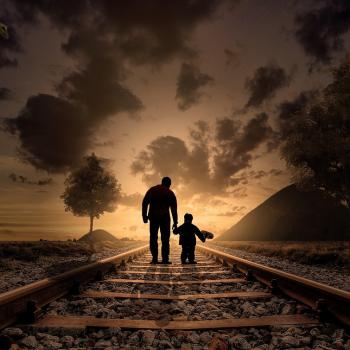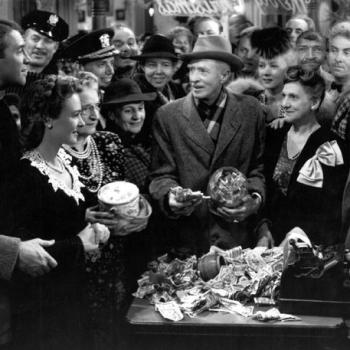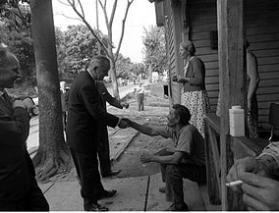
Fear drove the Jabara family from Lebanon.
Khalid, Rami and Victoria Jabara’s parents feared for their family’s safety in a place where bombs were falling and violence had become a way of life during a civil war that began in 1975 and continued for fifteen years.
The Jabaras are Christian – adding to their fears about persecution in a majority Muslim country.
So they decided – along with an estimated one million other Lebanese citizens – to give their family a fresh chance.
They came to the United States in the early 1980s, and ended up in Tulsa, Oklahoma, where the mother, Haifa Jabara, began what would become a popular and successful catering business. They lived in a neighborhood that had been peaceful and welcoming.
Then, their next door neighbor, Stephen Schmauss, began a relationship with a man whose dislike for the Jabaras was all-consuming.
“…filthy Arabs…”
Stanley Vernon Majors, who later married Schmauss, called the Jabara family “filthy Arabs” and “Mooslems” (his slang for Muslims, which, of course, they weren’t). He harassed them constantly from the time he moved in with Schmauss, hurling threats. Majors apparently already had a criminal record: Court records show that he had been convicted in California in 2012 for assault with a deadly weapon and making “criminal threats.”
As early as 2013, the Jabaras notified police. Ultimately, they filed a restraining order.
The threats against the Jabaras were frightening – but had remained verbal – until Majors hit Haifa Jabara with his car, critically injuring her.
Fear of a civil war may have driven the Jabara family from Lebanon. But fear had taken on an entirely different meaning in their new home.
After Majors hit Haifa Jabara with his car, the family hoped that he would remain in custody until his trial. But a judge – while acknowledging his concern – set bond for Majors. Majors returned home, and the harassment and threats resumed.
On August 12, 2016, an altercation apparently broke out between Schmauss and Majors. Shots were fired in their home, and Schmauss fled. 37-year-old Khalid Jabara had phoned his mother, warning her not to come home, because Majors was armed. Khalid phoned police, who took a report, told Khalid that there was nothing that they could do, and left.
Within 10 minutes of the police having left the Jabaras’ home, Majors was witnessed shooting Khalid on the Jabaras’ front porch. Khalid died from his injuries.
Khalid and his family would not be the only ones to suffer: Majors, who would ultimately be convicted and sentenced to life in prison for Khalid’s murder, died in prison just months into his sentence.
Three decades of the Jabara family’s peaceful living had devolved into a nightmarish tangled web of hatred. Why?
Hatred takes a bitter toll…
Hatred has fueled many unspeakable acts in our world. From nearly the beginning of creation, hatred has set brother against brother, son against father, neighbor against neighbor.
Cain chooses to kill his brother, Abel, in a moment of hatred because he perceives that his offering to the Creator isn’t valued as much as his brother’s.
Jacob chooses to deceive his dying father because he so covets the birthright and blessing that belong to his older brother, Esau, and he is willing to impair his relationships with both his father and his brother in his greedy desire.
Later, Jacob’s own sons will deceive him when they choose in their jealousy and hatred of their brother, Joseph, to sell him into slavery – but their tricks will come full circle when they find themselves beholden to Joseph when they are forced out of their homeland for food.
Abraham’s ancestors would grow numerous and strong in the land of Egypt, but long after Joseph had been forgotten, fear and hatred cause the Egyptian king, Pharaoh, to enslave the Israelites and subject them to harsh and brutal labor, building the Egyptian empire.
Jews settle peaceably into the land of Persia, and live among their neighbors – until the hatred of one leader brings the people under threat – and a beautiful Queen Esther is forced to make her identity known and speak a word to defend her people.
Hatred takes a bitter toll.
Where is the hope?
No doubt, as August 12 approaches each year, the trauma that the Jabara family has suffered is renewed. Our collective hearts should be broken with theirs in the remembrance of their tragic loss. Is there hope that the kind of hatred that far too often separates us can subside? How do we avoid judgment and hatred, and love our neighbors as we have been commanded?
Jesus shared a parable about an injured man who is aided by a stranger. Two Jewish religious leaders passed the injured man, going on their way. But the stranger – a Samaritan, whose people were scorned (Dare we say, hated?) by Jews – came upon the injured man, and at risk to his own well-being, stopped, rendered aid, took the man to an inn where he could recover, and paid the innkeeper the equivalent of two days’ wages to care for the man until he was able to journey home, and committed to pay any more that was required.
The stranger didn’t look at the injured man and judge. The stranger merely looked upon the injured man and saw his humanity.
Can we do likewise?




